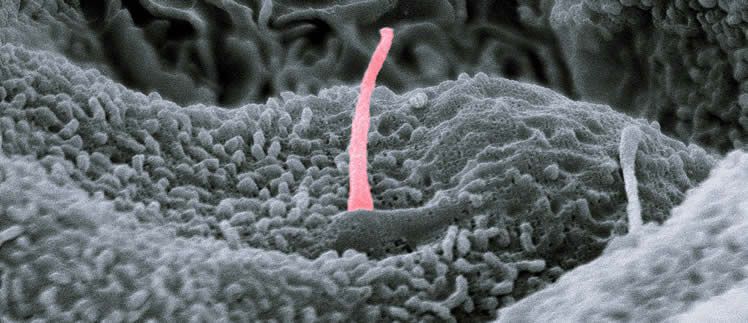
BESTCILIA established the first evidence-based pharmacotherapy for the rare disease primary ciliary dyskinesia
by Johanna Raidt & Heymut Omran for the BESTCILIA consortium
* University Hospital Münster, Germany
Primary ciliary dyskinesia (PCD) is a rare genetic disorder characterized by dysfunction of motile cilia associated with a chronic destructive airway disease caused by recurrent infections of the upper and lower airways. Bronchiectasis often progresses to chronic lung failure warranting lung transplant in severely affected individuals.
Unfortunately, evidence-based standards on treatment for PCD were completely missing, because it is often difficult to perform controlled trials for rare diseases also referred to as orphan diseases due to lack of sufficient patient numbers. The “Better Experimental Screening and Treatment for Primary Ciliary Dyskinesia” (BESTCILIA)- consortium coordinated by Heymut Omran (University Hospital Münster, Germany), who now coordinates the PCD core of ERN LUNG, aimed to aid this difficult situation and received funding from the European Union Seventh Framework Programme (FP7/2007-2013) under grant agreement n° 305404 (BESTCILIA). The multicenter, phase 3 trial from the BESTCILIA consortium that continued its work within the framework of the European Reference Center for Rare Lung Diseases (ERN-LUNG, https://ern-lung.eu/) and the COST Action Beat-PCD (BM 1407) successfully included 90 individuals with confirmed PCD from 6 European PCD clinics (Denmark, Germany, Netherlands, Switzerland and UK). Main responsible investigator for the trial was Kim Nielsen (University Hospital Kopenhagen, Denmark), who now heads the newly established ERN LUNG PCD Core Clinical Trial Network.
Participants had a predicted FEV1 > 40% and were between 7-50 years old. They were randomized to a 6-month treatment with azithromycin three times a week or placebo, respectively. The data of Koppernagel et al showed a significant reduction of respiratory exacerbations. The ground-breaking results of the first multinational randomized controlled trial on pharmacotherapy in PCD were published in the highly esteemed journal The Lancet Respiratory Medicine.
Macrolides, such as azithromycin, are well known to have antibiotic, anti-inflammatory as well as immunomodulatory functions and are therefore extensively investigated as a treatment option especially in respiratory conditions. Finally, Koppernagel and colleagues now demonstrate a positive impact of azithromycin on PCD-specific lung-disease for the first time. The treatment was overall well-tolerated. After the 6-month treatment period there was no change in lung function, but a significantly lower count of pathogenic bacterial species. The use of azithromycin potentially reduces additional antibiotic treatment and might prevent irreversible lung damage. Long-term studies with a treatment beyond 6 months, as existing for other chronic lung diseases, awaited to be performed in PCD.